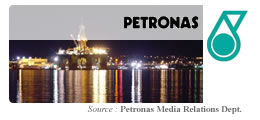 The Financial Year ended 31 March 2002 has been a challenging year for PETRONAS amidst a less favourable business environment due to the global economic slowdown. The impact of economic slowdown was further compounded by the effects of September 11th tragedy and increasing geopolitical instability in many parts of the world. The combination of these events dampened demand for energy and drove prices down, resulting in a 21% decline in the average price of Malaysian crude oil during the financial year.
The Financial Year ended 31 March 2002 has been a challenging year for PETRONAS amidst a less favourable business environment due to the global economic slowdown. The impact of economic slowdown was further compounded by the effects of September 11th tragedy and increasing geopolitical instability in many parts of the world. The combination of these events dampened demand for energy and drove prices down, resulting in a 21% decline in the average price of Malaysian crude oil during the financial year.
Financial Highlights
Despite the adverse business and economic environment, PETRONAS was able to mitigate the impact to its financial performance and operations largely due to its strategy to integrate, add value and globalise its operations which has successfully enhanced the Group’s competitiveness, resilience and operational efficiency. Consequently, PETRONAS recorded another year of satisfactory performance with strong revenue of RM 67.18 billion, albeit marginally lower by 8.4% from RM 73.35 billion previously. The percentage of revenue contraction is comparable to the decline recorded by integrated oil and gas majors which averaged between 9% and 12%.
Group profit before tax amounted to RM 24.32 billion, down 16.2% from RM 29.03 billion due to tight margins as a result of depressed prices, but well within the steeper decline of crude oil prices. PETRONAS’ return on revenue remained amongst the highest in the industry at 21.69%, compared to the average return on revenue of below 10% recorded by most oil and gas companies globally.
Overall, the financial performance recorded was the second highest in PETRONAS’ history.
The Group’s balance sheet position remained strong with total assets growing from RM 139.04 billion to RM 144.13 billion and shareholder’s fund increasing by 20% from RM 53.93 billion to RM 64.7 billion. Group total borrowing declined marginally to RM 40.4 billion as at 31 March 2002 against RM 40.6 billion in the last financial year. The majority of the Group’s long term loans are in US dollar which are naturally hedged by the Group’s predominantly dollar denominated revenue.
The Group’s cash and fund investment balance stood at RM 42.76 billion, putting PETRONAS in a healthy net cash position. The strong financial position enables PETRONAS to quickly capitalise on strategic opportunities whenever available.
Being an oil and gas company, the operations of PETRONAS are sensitive to three primary factors, namely crude oil prices, sales volume and the exchange rates. Crude oil prices weakened considerably during the year, with the sharpest falls recorded in the aftermath of September 11, 2001. In line with the steep fall in world oil prices, the average price of Malaysian crude oil declined to US$ 23.24 a barrel from US$ 29.86 a barrel in 2001. Despite the unfavourable business conditions, PETRONAS recorded higher sales volume for all its products — crude oil and condensates, refined petroleum products, Liquefied Natural Gas (LNG), sales gas and petrochemicals. The higher sales volume was achieved on PETRONAS’ competitiveness without giving away value in an environment of depressed prices.
Overall crude oil gross sales volume was higher at 339.48 million barrels compared to 330.83 million barrels in 2001. Revenue from the sales of crude oil however declined by 18.9% to RM 14.53 billion due to weaker oil prices.
Group gross sales volume of refined petroleum products, was also higher at 336.00 million barrels compared to 272.88 million barrels previously, with both PETRONAS Dagangan Bhd and Engen Limited of South Africa increasing their sales. Revenue however declined by 5.30% to RM 23.03 billion due to weaker petroleum product prices which averaged at US$ 24.38 per barrel compared to US$ 29.27 in 2001, a decline of 16.71%.
Weaker oil prices also impacted the prices of LNG, resulting in 8.55% decline in the average LNG price to US$ 4.28 per mmbtu from US$ 4.68 per mmbtu in 2001. Consequently, LNG exports for the year generated a revenue of RM 12.76 billion, down 11.17% from 2001 despite a 0.73 million tonnes increase in LNG volume sold.
Petrochemicals gross sales volume and revenue for the year however bucked the trend, recording a 19.13% jump in sales volume and 12.02% increase in revenue. The higher volume sold was attributed to the higher contribution from the Group’s petrochemical plants in Kertih and Gebeng as more of these plants came onstream.
Exports and international operations generated RM 51.17 billion in revenue, representing about 76% of Group revenue and earned valuable foreign exchange revenue for the nation. Contributions from outside Malaysia amounted to RM 20.36 billion, reflecting an increasing nature and importance of PETRONAS’ international operations.
Overall, the gross revenue of PETRONAS Group once again crossed the RM 100 billion mark for the second time in history to RM 121.89 billion despite the tough market conditions.
The 2002 financial year was another busy and fruitful year for PETRONAS in exploration and production, both at home and abroad.Domestic Exploration & Production
As at 1 January 2002, Malaysia’s crude oil reserves stood at 4.24 billion barrels, down marginally from 4.49 billion barrels in 2001. Natural gas reserves increased to 87.49 TSCF from 82.52 TSCF, and remained four times the size of oil reserves. At current rate of production, the average life for Malaysia’ oil and gas reserves is 17 and 34 years respectively.
Investments in Malaysia’s exploration and production activities continued to increase to meet the challenge of finding and developing new reserves in the country’s maturing acreages. During the year under review, the PSC contractors increased their investments substantially by 35% to a record RM 8.46 billion compared to RM6.26 billion in 2001, reflecting the confidence of investors towards Malaysia despite unfavourable conditions globally. About half of the total investment in the nation’s E&P sector was made by PETRONAS’ E&P subsidiary, PETRONAS Carigali Sdn Bhd. Foreign investments in the nation’s E&P sector alone represented about 25% of the total Foreign Direct Investment into Malaysia last year. The level of foreign investments in the country’s E&P sector is expected to continue to increase this year.
One new Production Sharing Contract was signed during the year, bringing the total active PSCs in the country to 41.
During the year under review, Malaysia produced a total of 245.71 million barrels of crude oil and condensates compared to 248.8 million barrels in the previous year. PETRONAS’ share of total production decreased to 75.1% from the previous year’s share of 77.83% on the back of lower oil prices and higher cost oil barrels entitlement for the Production Sharing Contracts (PSC) contractors.
PETRONAS exported 107.56 million barrels of its share of Malaysian Crude Oil (MCO) while 72.48 million barrels were sent for processing at PETRONAS refineries in Melaka and Terengganu, with the remainder being sold to other domestic refineries. PETRONAS strengthened its position in Asia’s crude oil market with 95.54% of its total MCO exports were sold in Asia compared to 80% in the previous financial year.
Malaysia’s natural gas production for the year increased marginally to 2.02 trillion standard cubic feet (TSCF) from 2.01 TSCF last year. A total of 1.63 TSCF was sold of which PETRONAS’ share decreased slightly to 72.3% from the previous year of 73.2% due to lower gas prices.
Combined, PETRONAS’ overall share of total domestic oil and gas production amounted to 1.04 million barrels of oil equivalent (BOE), representing 73.63% of the nation’s total oil and gas production.
International Exploration & Production
The Group continued to chart remarkable progress in the global arena with the signing of seven new PSCs and the acquisition of interests in eight exploration blocks in eight countries – extending PETRONAS’ portfolio of international exploration and production ventures to 39 in 21 countries. Two new PSCs were signed in Bahrain and one each in Yemen, Sudan, Equatorial Guinea, Indonesia and Vietnam. Interests in exploration blocks were acquired in Gabon (two blocks), Cameroon, Niger, Egypt, Yemen, Indonesia and Vietnam.
PETRONAS to date has accumulated international reserves of about 3.71 billion barrels of oil equivalent (BOE), including its share of the reserves at the Malaysia-Thailand Joint Development Area. This represents an increase of 458 million BOE from last year’s reserves figures. The international reserves account for 21% of PETRONAS’ total reserves, a significant amount considering that PETRONAS started its global foray only a decade ago.
PETRONAS’ share of international oil and gas production continues to rise and currently amounts to around 101,300 BOE per day with the biggest contribution coming from Sudan. The Group’s total production, both in Malaysia and overseas, currently amounts to 1.145 million BOE per day. Both the reserves and production numbers excludes PETRONAS’ share of production from Energy Africa and Premier Oil Plc.
The active E&P business was complimented by the continued expansion in the downstream sector, reflecting PETRONAS’ continued effort to further integrate its operations and add value to the nation’s hydrocarbon resources. This value adding strategy has benefited the Group as reflected by the higher share of the group’s manufacturing activities to revenue, representing 64.38% of the Group’s total revenue compared to 61.19% last year which is equivalent to RM 43.25 billion. Of significance, the share of the Group’s manufacturing activities increased amidst the gloomy environment of depressed prices. Contribution from manufacturing is set to grow further in the future with the completion and full operation of the Group’s integrated petrochemical complexes in Kertih and Gebeng and the third LNG plant in Bintulu in 2003.
Oil Business
Sales of crude oil and refined petroleum products remained the largest contributor to Group revenue, contributing RM 37.56 billion (Crude Oil: RM14.53 billion; Petroleum Products: RM 23.03 billion) despite difficult trading environment worsened by the September 11 tragedy and the emergence of new suppliers from the former Soviet Union, especially Russia.
Marketing and refining margins remained weak due to volatile crude and petroleum products prices, strong competition as well as excess in refining capacities in the region. Despite the tight margin, PETRONAS maintained the utilisation rates of its domestic refineries at above 90% during the year to fulfill both domestic and export requirements. The year under review also saw the completion of equity transfer in Malaysian Refining Company Sdn Bhd following Statoil’s divestment in the refinery, increasing PETRONAS’ share to 53% from 45% previously. In total, PETRONAS currently has net refining capacities of 340,500 bpd through its refineries in Kertih (40,000 bpd refinery and 63,500 bpd condensate splitter), Melaka (100,000 bpd PSR-1 and 53,000 bpd PSR-2) and Durban, South Africa (84,000 bpd refinery).
Overseas, PETRONAS commenced the commercial operation of its LPG terminal in Haldia, India in October 2001. The facility which has an annual capacity of 600,000 MT is a 50:50 joint venture with Indian Oil Corporation.
Downstream Gas Business
LNG sales generated a revenue of RM12.76 billion and remained the third largest revenue earner for the Group. Japan continued to be Malaysia’s largest LNG customer, taking up 73.52% of LNG exports followed by Taiwan with 15.08% and South Korea, the remaining 11.40%. In terms of market share, Malaysia holds about 38% of Taiwan’s LNG market, 21% of Japan’s, 14% of South Korea’s.
With the completion of MLNG 3 plant in 2003, Malaysia’s LNG production capacity will be boosted to about 23 mmtpa and will give PETRONAS the largest production capacity in the world at a single location.
Petrochemical Business
The petrochemical business posted higher sales revenue and higher sales volume despite weaker domestic and international demand and lower sales prices for most petrochemical products. Petrochemicals revenue during the year increased by 13.67% from RM2.99 billion to RM3.4 billion while gross sales volume increased to 7.16 million tonnes from 6.01 million tonnes in the last financial year, primarily due to the coming on stream of new plants and the efficiency realisation from the integration of plants in the Group’s two Integrated Petrochemical Complexes (IPCs).
The Group is poised to derive higher revenue contribution from the petrochemical business as the full benefit from the integration of plants is optimised. The coming on stream of the new plants at the Group’s two IPCs will also strengthen Malaysia’s position to become a regional petrochemical hub.
Maritime and Logistics Business
The Group’s Maritime and Logistics business continues to operate satisfactorily in the backdrop of the weak global economy. The continuous slowdown in the world economy and depressed market conditions exacerbated by the effects of September 11 had resulted in industry over capacity and falling freight rates, dragging revenue down marginally to RM5.96 billion from RM5.98 billion previously.
The outlook for the shipping industry is expected to remain challenging with over-tonnage and weak freight rates in the dry bulk shipping and liner segments due to its sensitivities to levels of business activities worldwide. However, the Group’s Maritime and Logistics business is poised to weather the storm ahead with stronger contribution from the LNG shipping segment with the coming onstream of the MLNG 3 project in the first quarter of 2003. Malaysia International Shipping Corporation Berhad (MISC), the Group’s 62.4% subsidiary, is currently the world’s single largest owner and operator of LNG tankers with a fleet capacity of 13 tankers. MISC has ordered six more new LNG tankers which will be delivered on a staggered basis from September this year to March 2005. The coming into service of the new tankers will enable PETRONAS/MISC to further enhance its capability and flexibility to provide safe and reliable transportation of LNG, thus strengthening its position as the world’s single largest LNG fleet owner and operator.
The financial year ended 31 March 2002 was indeed an extraordinary year.
Oil prices were at their lowest in three years amidst a bleak climate arising from the sluggish economic conditions in the United States, Europe and Japan. Asia’s recovery from the 1997 economic crisis was hampered by the protracted economic slowdown of its biggest trading partner, the United States and the uncertainty arising from China’s accession into the WTO. The September 11 tragedy aggravated the impact further and heightened the uncertainty in the already fragile world economy. The Afghanistan war and added impetus to the continued Palestine-Israel conflict only serve to send the already depressed oil industry into deeper doldrums.
Against these odds, PETRONAS managed to chart another year of strong financial performance which is comparable to those recorded by other industry players, most of whom are much bigger in size and scale of operations as well as resources. Major inroads continued to be made by PETRONAS both at home and in the international arena, especially in the upstream sector.
PETRONAS believes that it has built a strong foundation to enable it to compete effectively and will continue to pursue appropriate and strategic measures to ensure its continued growth and long term survival. It will continue to invest in capacity and capability building and prudently utilise its financial resources to tap on available opportunities in the increasing challenging and changing business landscape.
Issued by
Legal and Corporate Affairs Division

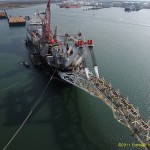


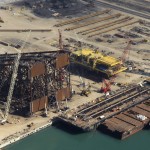
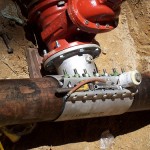


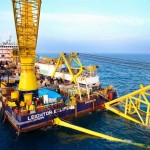
Leave a Reply